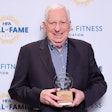Copyright 2017 Gannett Company, Inc.
All Rights Reserved
USA TODAY
When the diagnosis became public, the well-wishes poured in. Cards, letters, posters and more fill Bill Snyder's office in Manhattan, Kan. "So thoughtful," he says. But so many arrived that, in a departure from his long-held practice, the coach determined he couldn't personally respond to them all in writing. Instead, he wrote a form letter -- typed and mailed by his secretary -- that included an explanation for the impersonal reply.
"But after I did that, I thought, 'You know, it's not me,'" Snyder says.
That's why for the past few weeks, since finishing 33 treatments for throat cancer, Snyder has made it part of his daily routine to write thank-you notes to everyone who wrote him. Hundreds?
"Oh, more than that," he says, adding with a trace of pride, "I finally caught up two days ago."
Sitting, legs crossed, on a veranda overlooking a golf course, Snyder could for all the world be another retiree to the Arizona desert. Except he's wearing a navy pinstripe suit (no tie). And if he's relaxing now, a dining table just inside the villa is covered with files and paper, evidence of another offseason day's work.
The oldest coach in college football, Snyder turns 78 in October. And after a difficult winter, he looks it. He appears to have lost weight. His silver hair has thinned. He speaks quietly -- but then, he has always been soft-spoken.
"I feel fine," Snyder says without elaborating. But later, in a 40-minute interview, he acknowledges the effects of the treatments -- a debilitating fatigue -- remain.
"They had warned me about that," he says. "It can really knock you around a little bit."
Somehow, he powered through the treatments, which for six weeks involved a schedule that regularly went something like this: Drive nearly two hours to Kansas City, Kan. Spend the night. Get treatment in the morning, drive back, work in the office. Get up the next day and do it again.
"I was able to be in my office every day," he says.
Even when Snyder was in Manhattan, his legendary hours were cut short. He worked from home more often but says the workload didn't change much, just the location. During the Wildcats' spring game last month, Snyder spent the second half watching from the coaches' booth in the press box. Asked about it afterward, he told a reporter, "Don't be curious."
But what everyone is curious about is not necessarily new. When will Snyder retire? What happens when he does? In his conversation with USA TODAY Sports during the Big12 Conference's annual spring meetings at the Arizona Biltmore, there was no hint from Snyder.
Well into his second tenure as Wildcats coach, he seems set on coaching at least his 26th season at Kansas State. And beyond that?
"It can't go on forever, that's for sure," he says. "I don't want it to go on forever. But I don't know. I've preached it one year at a time, and that's the way it's been for the last several years. No particular reason why that will change."
Questions and concerns
Snyder, who has a PET scan scheduled for June 1, understands his health situation has intensified the questions about his coaching future. But he says this postseason he went through the same process as in the past few years. He polled his wife and five children and asked himself several questions.
"Is what I'm doing effective? Do I still have a positive influence on the lives of the young people in our program? Are they still responsive to me and what I deem important? And is it something that my family is on board with?"
Family is a huge part of the calculation. A dozen years ago when Snyder was set to retire for the first time, then-athletics director Tim Weiser told him the school was going to name its football stadium after him. Snyder insisted it be named Bill Snyder Family Football Stadium. He says he wanted to honor his actual family, but also Kansas State's football program and the overall community, which he likens to a family.
Snyder's contract, signed in January 2013, stipulates he will have "appropriate input" in the search for his replacement. He wants his son, Sean, a longtime Kansas State assistant coach who was a standout punter there, to succeed him.
"Sean virtually runs the program right now," Snyder says when asked directly if Sean Snyder should get the job when he's finished. "He has served in so many capacities. He was the associate athletic director, he's the associate head coach, special-teams coordinator. ... He served as director of operations for a long time. So he knows more than anybody on that campus. He knows Kansas State University football."
Asked again -- you would like Sean to succeed you? -- Snyder deflects the question, but only slightly.
"I told him I would prefer he didn't," Snyder says, "just because I hate to guide anybody in that direction. It can beat you down. It's a lifetime-consuming happening. But he wants to do it, and I support him 150%."
And if Sean isn't named to succeed him, whenever that is?
"It's their decision to make," Snyder says. "I'm sure they'll have a good reason for doing what they do.
If Sean really wanted to do it, then yes, it would be disappointing."
In other words, Kansas State might have a looming quandary. Whenever Snyder finally is finished, does it acquiesce to his wishes and appoint his son, who despite his experience on the K-State staff has never been an offensive or defensive coordinator? Or does it risk alienating the man who built -- well, the guy who built everything?
Transformative figure
Former Oklahoma coach Barry Switzer, whose teams regularly routed the pre-Snyder Wildcats, once called Snyder the "coach of the century." In 2015, Snyder was enshrined in the College Football Hall of Fame -- the fourth coach to receive that honor while active. That last part is almost as impressive as the initial building project. In Snyder's continuing second act, he has maintained the success at an age when most coaches are whiling away time on the golf course.
Still, Snyder knows coaches from other programs use his age as a recruiting weapon.
"I can't do anything about it," he says. "I'm not going to lie about my age. It is what it is."
And he says players should choose a school not because of a coach -- or facilities, even as he notes Kansas State has caught up recently in that department -- but "for the right reasons," mostly meaning an education.
"Even if I were 40 years old, don't come here because of me," he says he tells recruits. "Come here for all the right reasons. It's kind of like facilities. A young guy sees the glitz and glitter and thinks, 'That's for me.' That's totally the wrong reason, in my eyes."
That goes even now, when Kansas State's facilities have plenty of glitter. Over the last few years, Kansas State has poured $210 million into athletics facilities, including about $185 million directly for football.
But it's more than wins, sellouts, atmosphere and buildings. Snyder's impact -- on the football program, the university and the region -- might be immeasurable. Pulling off Interstate 70, you drive into Manhattan on Coach Bill Snyder Highway. When Gene Taylor, Kansas State's new athletics director, says he has heard Manhattan has a regional commercial airport because of Snyder -- well, that's hard to quantify, but he's not far off. As former athletics director John Currie, who should be credited for much of the facilities upgrades, told USA TODAY Sports in March: "None of this stuff is here without him."
What happens without him, whenever that is, is an open -- and these days, pressing -- question.
Looming question
In facilities and resources, at least, the foundation for sustained success seems to be in place.
And, yet, there's an obvious fragility. As evidence, look back a dozen years to when Snyder retired for the first time. Kansas State hired Ron Prince, who went 17-20 in three seasons. With the program fast slipping back into irrelevance, Snyder returned; Kansas State is 66-37 since. But, especially given today's shifting college football landscape, the future is uncertain.
In January 2013, on the heels of winning the Big 12 championship, Snyder was given a new five-year contract with an automatic rollover; the current expiration date is January 2022. (He'll make $3.2 million this year.) But as Snyder says, he re-evaluates his situation every year.
Currie, who recently left for the same position at Tennessee, told people he thought about the situation every day. Now, that task falls to Taylor, who officially started as Kansas State's athletics director last week.
Snyder was not part of the school's eight-person search committee to replace Currie. But Snyder and Taylor, an ex-athletics director at North Dakota State and more recently deputy AD at Iowa, had a phone conversation the day Taylor was offered the job. Snyder asked two questions: "What do you know about Kansas State?" Taylor recalls. "Do you think you'd be a fit?"
Taylor explained that North Dakota State, where he was athletics director for 13 years, and Kansas State felt very similar. And how, after North Dakota State had beaten Kansas State in 2013, he walked off the field and thought to himself, "This is a place I could work someday. If John Currie ever left, this would be a job I would try to go after."
A couple of hours later, Kansas State President Richard Myers called to ask Taylor if he would like to be the Wildcats' next athletics director. Upon accepting, Taylor assured that his most important priority, at some point in the future, would be how to replace Snyder.
Taylor says he has had general conversations with Myers and has told Snyder, "I hope you coach here as long as you want, and we'll cross that bridge when we come to it."
He has learned this much: "A lot of people have a lot of opinions," he says, about what should transpire when Snyder hangs up the whistle.
"We've got to figure it out," Taylor says. "Someday, Coach Snyder is not gonna coach anymore. ... That's gonna be one of the biggest things on my plate. I hope it doesn't come anytime soon, but eventually it will."
On a beautiful spring afternoon in Arizona, Snyder provides no sign it will be anytime soon. The PET scan next month will tell, but he's optimistic that the cancer treatments worked. He's tired, yes -- but he's hopeful that will subside, too.
"There's an exhaustion that is unlike anything you've ever felt," he says. "It's a different feeling than (being tired after) going out and running. I can't even describe it. I've never felt that way in my life, and I couldn't imagine feeling like that, and it kind of carries over. And that goes on for quite a while. They said it will be awhile before all that wears itself out."
If his physical appearance has changed, if his stamina is at least temporarily diminished, Snyder remains the same coach -- focused only on getting better today, fixated always on process rather than outcome. Expectations are high for a team that has 14 starters back from last year's 9-4 squad. But Snyder says only, "We've got a long way to go before that happens."
He seems every bit committed to the same, gradual progression he has employed for so many years -- as though it could be awhile yet before he wears himself out.
Read More of Today's AB Headlines
Subscribe to Our Daily E-Newsletter
Terms and Conditions Privacy Policy



































